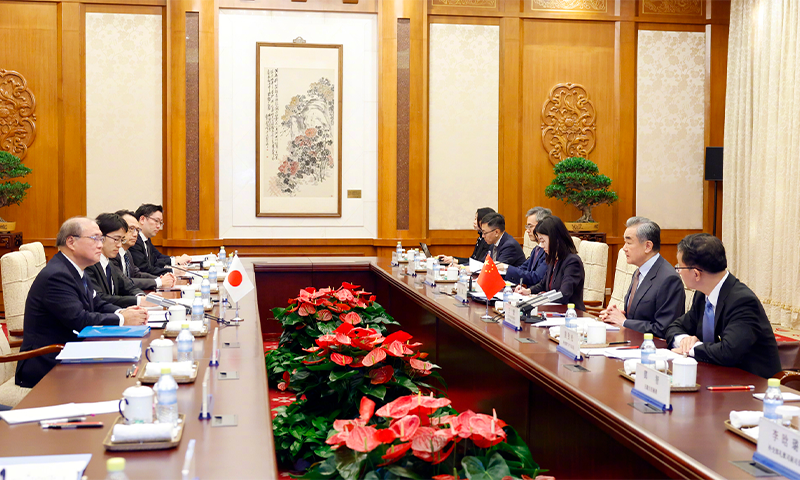
Chinese Foreign Minister Wang Yi and Takeo Akiba, special adviser to the Japanese cabinet and secretary general of Japan's National Security Secretariat, held consultations under the China-Japan high-level political dialogue mechanism in Beijing on November 4, 2024. Photo from the website of Chinese Foreign Ministry
Chinese Foreign Minister Wang Yi and Takeo Akiba, secretary general of Japan's National Security Secretariat, held consultations under the China-Japan high-level political dialogue mechanism in Beijing on Monday. The two sides reiterated that they will abide by the principles and consensus set out in the four political documents between China and Japan and commit to comprehensively advancing the strategic relationship of mutual benefit between the two sides, reaching agreement to maintain high-level intercourse, dialogue and exchanges in various fields, and send more positive signals to the outside world.
Noting that China-Japan relations are at a critical stage of improvement, Wang, director of the Office of the Foreign Affairs Commission of the Communist Party of China (CPC) Central Committee and member of the Political Bureau of the CPC Central Committee, said the two sides should follow the consensus reached by the leaders of the two countries, stick to the right direction of improving and developing bilateral relations, and build a constructive and stable China-Japan relationship that meets the requirements of the new era, Xinhua News Agency reported.
Experts said the meeting shows that the Shigeru Ishiba administration recognizes the importance of Japan's relationship with China, and of handling it with a pragmatic and rational attitude, which will inject positivity and stability into bilateral ties. A stable China-Japan relationship is also beneficial for the governance stability of the Ishiba administration, they noted.
Wang said the Japanese side should establish an objective and rational understanding of China, honor its political commitment on the Taiwan question and earnestly safeguard the political foundation of China-Japan relations, urging the Japanese side to take concrete actions to implement the important consensus of "being each other's cooperation partners rather than threats," and promote the steady and long-term development of bilateral ties.
On the discharge of nuclear-contaminated water from the Fukushima Daiichi Nuclear Power Station, the two sides agreed to accelerate the follow-up and implementation of the bilateral political consensus.
It is hoped that all parties will jointly resist non-regional forces inciting confrontation in the area and take concrete actions to safeguard regional peace and stability, Wang added.
Since Ishiba assumed office, high-level interactions between China and Japan have become more frequent. On October 10, Chinese Premier Li Qiang met with Ishiba on the sidelines of the leaders' meetings on East Asia cooperation held in Vientiane, Laos.
Before Monday's meeting, Wang and Akiba held a phone call on October 21.
Xiang Haoyu, a research fellow in the Department for Asia-Pacific Studies of China Institute of International Studies, told the Global Times that since Ishiba came to office, China-Japan relations have achieved a relatively smooth transition, as the new Japanese cabinet has recognized the importance of China-Japan relations and adopted a relatively pragmatic and rational attitude.
According to Xiang, over the past year, China-Japan relations have continued to stabilize on the whole, but still face major problems including lack of political mutual trust, security suspicion, and weakening economic and trade cooperation momentum, which is related to Japan's negative perception of China, and also affected by great power competition and geopolitical conflicts.
Considering that the Ishiba cabinet is currently a in a relatively weak position at home and that great uncertainty lies ahead in Japanese domestic politics in the future, how to strengthen the predictability and certainty of bilateral relations through high-level exchanges has become crucial, said Xiang, adding that a stable China-Japan relationship is also beneficial for the governance stability of the Ishiba administration.




